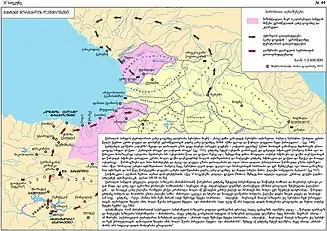Vakhtang I's invasion of Ossetia
Vakhtang I of Iberia's Invasion In Ossetia was an invasion by the Iberians in North Caucasus against the Alans, with the Alans being allied with the Khazars.
| Vakhtang's Invasion in Ossetia | |||||||||
|---|---|---|---|---|---|---|---|---|---|
| Part of Vakhtang's Invasions | |||||||||
 | |||||||||
| |||||||||
| Belligerents | |||||||||
| Kingdom of Iberia |
Alans Khazars Huns | ||||||||
| Commanders and leaders | |||||||||
| Vakhtang I |
Tarhan † Bataqar | ||||||||
Vakhtang I of Iberia campaigned in the Northern Caucasus during the invasion and prevailed after four months. Vakhtang's victory weakened the Huns and added the Dariali Gorge to his domain.[1]
Background
According to the writings of Juansher, "The Life of Vakhtang Gorsagali", the fifteen-year-old Vakhtang I settled the case with the Shah of Iran and the military resources of the Shah's subjects for a campaign in the North Caucasus against the Ossetians and other nomadic tribes living in the North Caucasus plains. The tribes moved to the south, and dispersed not only in Iberia, but also in Iran and territories under its influence.
At that time, the Ossetians held the younger sister of the Georgian king in captivity, as well as many Georgians and Caucasian Albanians. The goal of King Vakhtang was to free his sister and the Georgians from the captivity of the Ossetians, as well as to spread his influence in the North Caucasus, and to capture the crossing points of the Caucasus. Another wish of his was to expel the Byzantines and restore Georgian politics in Western Georgia.[2]
Invasion
In 458 CE, fifteen-year-old Vakhtang I of Iberia ascended the throne of Iberia. Immediately after his ascension, he ordered military preparations, then at the age of 16, he organized a counter-campaign to the North Caucasus. In a battle on the banks of the Tergi River, the army of Vakhtang defeated the army of the Ossetians and their allies. The Georgian king's army chased and killed a large part of the opposing army, and captured many of them in order to change them into Georgians, which was a common practice in ancient times.
Afterward, Gorgasali (Vakhtang's second name) rested his army for three days, and the soldiers praised God for the victory. The army then divided into squads, broke into the enemy's territory, and began raiding Ossetia and destroying its towns.
In addition to the Ossetians, other nomadic tribes were subdued. Vakhtang built and renovated several castles in a narrow valley, such as Dariali, which is also known as Alanta Kari (Darialani).
Aragvi's gate was also called Dariela, which was named after the god (Daria, Dari) of the old pantheon of the mountain Bezhan Abashidze. However, the name was later attributed to the Alans. King Vakhtang placed Georgian mountaineers in Dariali castles.[3] From that day, no one could cross the Caucasus through the Dariali valley without the consent of the king of Iberia.[4]
At that time, it was possible to disembark the army from the North Caucasus at three points. One was the coast of Abkhazia, where there was a border checkpoint near the ancient Lazika (later Nicosia), while the second was in the Dariali valley. The coast of Abkhazia approaches the third point, the crossing of Derbent, which was not connected to Georgia, and in the south of the road, there were the possessions of the vassals of the Shah of Persia.
They moved to the territory of the nomadic tribes bordering the Ossetians, in the valleys and fields of the branches of the Tergi River, and to the north of it. At that time, the Jiks also lived in the North Caucasus. Only later did the Jiks move and settle in the bottom of Abkhazia, which was later called Jiketi by the Georgians (the Russians had cut them off). The area starts in the northwest of the Gagra District and continues to the northwest of the city of Sochi. The invasion ended with the defeat of the Alans. Vakhtang I subdued the Alans and freed the captives, including his young sister Mirandukhti.[2] He occupied the Dariali fortress and strengthened the northern border of Iberia.[4][5]
After the Invasion

After 3 years, Vakhtang returned to his country. At the time, he was 19 years old. His mother, sisters and residents of Mtskheta came forward. Citizens spread clothes and flowers on his horse, threw drums and drachms, and praised the ruler. They sang these verses:
King Vakhtang was loved by God,
A river fell from the sky
He stepped on the Yalbuza,
The great mountains began to rise.[2]
passed through the Ossetians,
Kicking Circassians out.[6]
The ruler of Iberia spent many nights in prayer to thank God. He gave gifts to peasants and citizens and rewarded his soldiers. From the spoils of war, he sent to his uncle, the Shah of Persia: a thousand slaves, a thousand wild horses, and a thousand female horses. Then whose order he was helped by Rani Eristavi Varaz-Bakur, he sent ten thousand slaves, ten thousand naked horses, and ten thousand female horses. He married the daughter of the Sasanian Shah, Balendukht.[2]
References
- "Kartlis samepos črdilok'avk'asiuri p'olit'ik'is ist'oriis erti purceli [=] A page from the history of the north Caucasian politics of the kingdom of Kartli". unora.unior.it. Retrieved 2023-10-23.
- "რატომ აინტერესებდა ვახტანგ გორგასალს ჩრდილო კავკასიიდან სამხრეთში გადმოსასვლელი კარიბჭეები". tbiliselebi.ge. Retrieved 2023-10-20.
- "Dariali Castle". Castles.nl. 2023. Retrieved 22 October 2023.
- Sauer, Eberhard (2020-04-30). Dariali: The 'Caspian Gates' in the Caucasus from Antiquity to the Age of the Huns and the Middle Ages: The Joint Georgian-British Dariali Gorge Excavations and Surveys of 2013–2016. Oxbow Books. ISBN 978-1-78925-195-1.
- "მართლმადიდებელი ეკლესია დღეს ვახტანგ გორგასლის ხსენების დღეს აღნიშნავს". ghn.ge. Retrieved 2023-10-20.
- "ვახტანგ მეფე ღმერთს უყვარდა - ხალხური პოეზია - Aura.Ge". www.aura.ge. Retrieved 2023-10-21.
